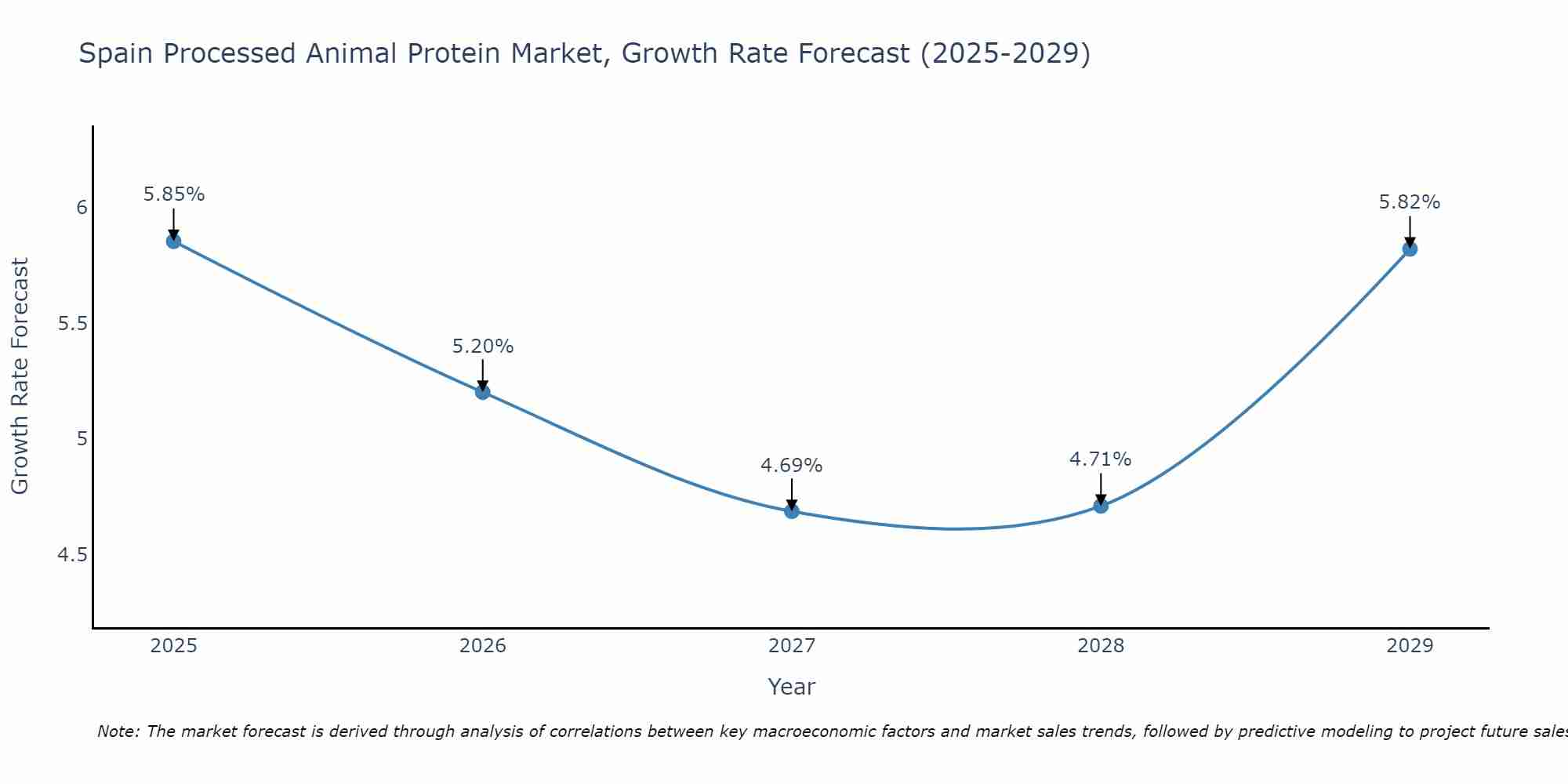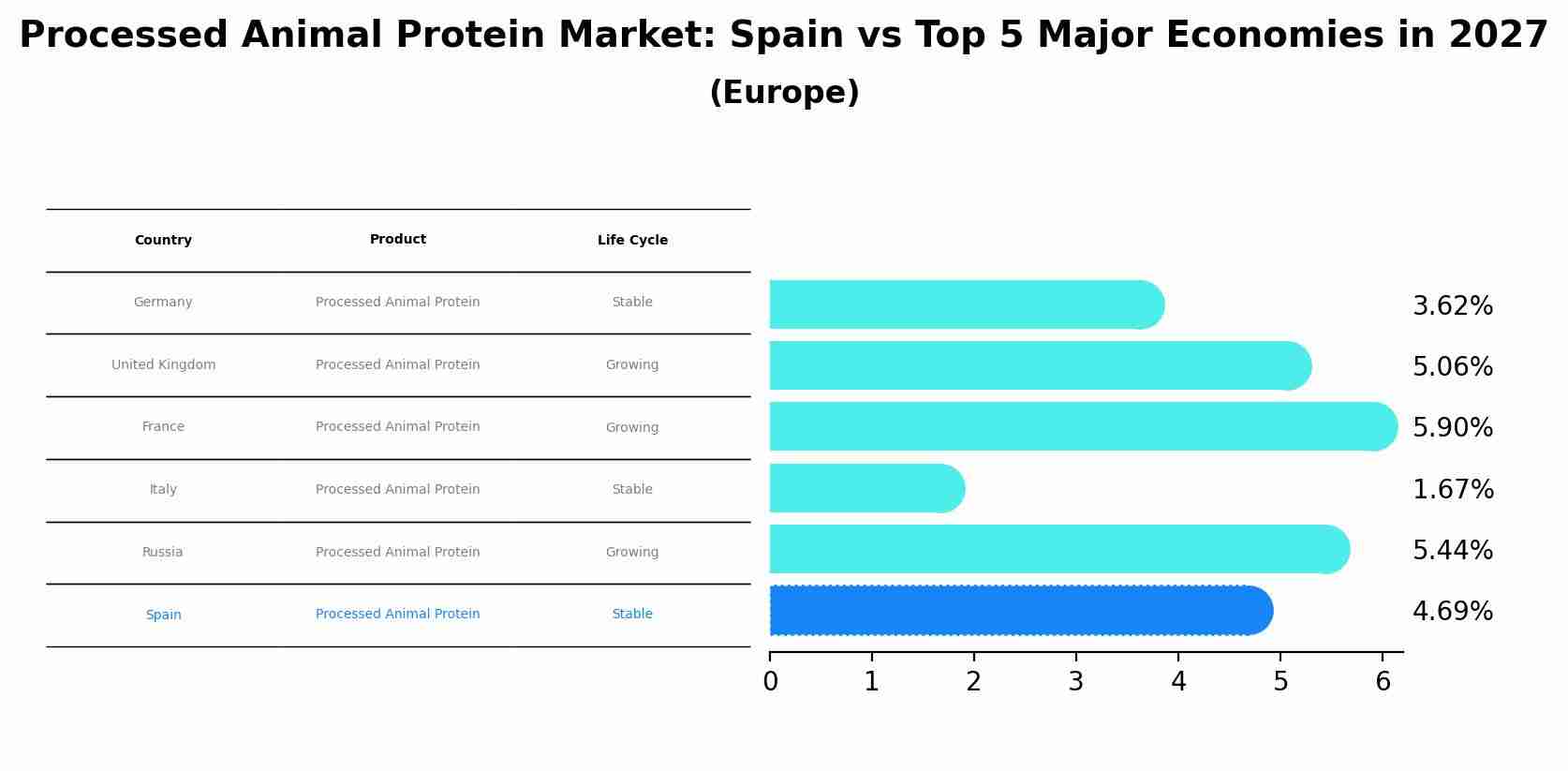Spain Processed Animal Protein Market Outlook | Size, Growth, COVID-19 IMPACT, Forecast, Analysis, Companies, Value, Industry, Revenue, Trends & Share
| Product Code: ETC411910 | Publication Date: Oct 2022 | Updated Date: Jul 2025 | Product Type: Market Research Report | |
| Publisher: 6Wresearch | Author: Shubham Padhi | No. of Pages: 75 | No. of Figures: 35 | No. of Tables: 20 |
Spain Processed Animal Protein Market Size Growth Rate
The Spain Processed Animal Protein Market is projected to witness mixed growth rate patterns during 2025 to 2029. Although the growth rate starts strong at 5.85% in 2025, it steadily loses momentum, ending at 5.82% by 2029.

Processed Animal Protein Market: Spain vs Top 5 Major Economies in 2027 (Europe)
The Processed Animal Protein market in Spain is projected to grow at a stable growth rate of 4.69% by 2027, within the Europe region led by Germany, along with other countries like United Kingdom, France, Italy and Russia, collectively shaping a dynamic and evolving market environment driven by innovation and increasing adoption of emerging technologies.

Spain Processed Animal Protein Market Synopsis
The Spain processed animal protein market is characterized by a growing demand for high-quality animal feed ingredients derived from meat and bone meal, poultry meal, and fish meal. This market is driven by the increasing awareness among livestock farmers about the benefits of using protein-rich feed additives to enhance animal growth and health. The stringent regulations related to the use of processed animal proteins in livestock feed have led to a shift towards more sustainable and traceable sources of animal protein products. Key players in the Spain processed animal protein market are focusing on product innovation and strategic partnerships to cater to the evolving needs of the livestock industry. Overall, the market is expected to witness steady growth in the coming years as the demand for premium animal feed ingredients continues to rise.
Spain Processed Animal Protein Market Trends
In the Spain Processed Animal Protein Market, there are several notable trends emerging. One key trend is the increasing demand for high-quality and sustainable animal protein products. Consumers are seeking products that are ethically sourced, with a focus on animal welfare and environmentally friendly production methods. Additionally, there is a growing preference for innovative protein sources such as plant-based proteins and alternative animal proteins like insect-based products. Health and wellness concerns are also influencing purchasing decisions, leading to a rise in the consumption of protein-rich products that are low in additives and preservatives. Overall, the market is shifting towards more diverse and eco-conscious offerings to meet the changing preferences of consumers in Spain.
Spain Processed Animal Protein Market Challenges
In the Spain Processed Animal Protein Market, several challenges are faced that impact the industry`s growth and profitability. One significant challenge is the increasing scrutiny and regulations surrounding animal feed and protein sources, particularly in relation to food safety and sustainability concerns. This has led to stricter requirements and standards that companies must adhere to, increasing production costs and potentially limiting the availability of certain protein sources. Additionally, fluctuations in raw material prices and the competitive landscape within the market pose challenges for companies operating in this sector. Adapting to changing consumer preferences, such as the rising demand for plant-based protein alternatives, further complicates the market dynamics for processed animal protein companies in Spain. Overall, navigating these challenges requires strategic planning and innovation to remain competitive in the evolving market environment.
Spain Processed Animal Protein Market Investment Opportunities
The Spain Processed Animal Protein Market offers promising investment opportunities due to the increasing demand for animal protein products in the country. Key areas for investment include the production and processing of meat, poultry, and fish products, as well as the development of innovative protein sources such as plant-based alternatives and cultured meats. With a growing focus on sustainability and health-conscious consumer preferences, investing in technologies and processes that enhance production efficiency, reduce environmental impact, and improve product quality can be lucrative. Additionally, opportunities exist in the distribution and marketing of processed animal protein products to meet the evolving needs of the Spanish market. Overall, investors in the Spain Processed Animal Protein Market can capitalize on the rising demand for diverse and sustainable protein sources in the country.
Jordan Agar Market Government Policies
In Spain, the processed animal protein market is subject to regulations set by the European Union, particularly regarding food safety and traceability. The EU regulations dictate strict guidelines for the production, processing, and labeling of animal-based products to ensure consumer protection and prevent the spread of diseases like BSE (mad cow disease). Additionally, the Spanish government has implemented its own national policies to monitor and control the quality and safety of processed animal proteins, including regular inspections and strict enforcement of industry standards. Compliance with these regulations is essential for businesses operating in the processed animal protein market in Spain to maintain consumer trust and access to both domestic and international markets.
Spain Processed Animal Protein Market Future Outlook
The future outlook for the Spain Processed Animal Protein Market appears promising, driven by factors such as increasing consumer demand for protein-rich food products, technological advancements in processing techniques, and growing awareness about the nutritional benefits of animal protein. The market is expected to witness steady growth in the coming years, with a focus on product innovation, sustainable sourcing practices, and expanding distribution channels. Additionally, the rising trend of plant-based alternatives may pose a challenge to the market, prompting companies to invest in research and development to cater to changing consumer preferences. Overall, the Spain Processed Animal Protein Market is poised for expansion, offering opportunities for industry players to capitalize on evolving consumer trends and maintain a competitive edge in the market.
Key Highlights of the Report:
- Spain Processed Animal Protein Market Outlook
- Market Size of Spain Processed Animal Protein Market, 2021
- Forecast of Spain Processed Animal Protein Market, 2031
- Historical Data and Forecast of Spain Processed Animal Protein Revenues & Volume for the Period 2018 - 2031
- Spain Processed Animal Protein Market Trend Evolution
- Spain Processed Animal Protein Market Drivers and Challenges
- Spain Processed Animal Protein Price Trends
- Spain Processed Animal Protein Porter's Five Forces
- Spain Processed Animal Protein Industry Life Cycle
- Historical Data and Forecast of Spain Processed Animal Protein Market Revenues & Volume By Source for the Period 2018 - 2031
- Historical Data and Forecast of Spain Processed Animal Protein Market Revenues & Volume By Poultry for the Period 2018 - 2031
- Historical Data and Forecast of Spain Processed Animal Protein Market Revenues & Volume By Pork for the Period 2018 - 2031
- Historical Data and Forecast of Spain Processed Animal Protein Market Revenues & Volume By Beef for the Period 2018 - 2031
- Historical Data and Forecast of Spain Processed Animal Protein Market Revenues & Volume By Others for the Period 2018 - 2031
- Historical Data and Forecast of Spain Processed Animal Protein Market Revenues & Volume By Form for the Period 2018 - 2031
- Historical Data and Forecast of Spain Processed Animal Protein Market Revenues & Volume By Dry for the Period 2018 - 2031
- Historical Data and Forecast of Spain Processed Animal Protein Market Revenues & Volume By Liquid for the Period 2018 - 2031
- Spain Processed Animal Protein Import Export Trade Statistics
- Market Opportunity Assessment By Source
- Market Opportunity Assessment By Form
- Spain Processed Animal Protein Top Companies Market Share
- Spain Processed Animal Protein Competitive Benchmarking By Technical and Operational Parameters
- Spain Processed Animal Protein Company Profiles
- Spain Processed Animal Protein Key Strategic Recommendations
Frequently Asked Questions About the Market Study (FAQs):
- Single User License$ 1,995
- Department License$ 2,400
- Site License$ 3,120
- Global License$ 3,795
Search
Related Reports
- Vietnam System Integrator Market (2025-2031) | Size, Companies, Analysis, Industry, Value, Forecast, Growth, Trends, Revenue & Share
- ASEAN and Thailand Brain Health Supplements Market (2025-2031) | Strategy, Consumer Insights, Analysis, Investment Trends, Opportunities, Growth, Size, Share, Industry, Revenue, Segments, Value, Segmentation, Supply, Forecast, Restraints, Outlook, Competition, Drivers, Trends, Demand, Pricing Analysis, Competitive, Strategic Insights, Companies, Challenges
- ASEAN Bearings Market (2025-2031) | Strategy, Consumer Insights, Analysis, Investment Trends, Opportunities, Growth, Size, Share, Industry, Revenue, Segments, Value, Segmentation, Supply, Forecast, Restraints, Outlook, Competition, Drivers, Trends, Demand, Pricing Analysis, Competitive, Strategic Insights, Companies, Challenges
- Europe Flooring Market (2025-2031) | Outlook, Share, Industry, Trends, Forecast, Companies, Revenue, Size, Analysis, Growth & Value
- Saudi Arabia Manlift Market (2025-2031) | Outlook, Size, Growth, Trends, Companies, Industry, Revenue, Value, Share, Forecast & Analysis
- Uganda Excavator, Crane, and Wheel Loaders Market (2025-2031) | Strategy, Consumer Insights, Analysis, Investment Trends, Opportunities, Growth, Size, Share, Industry, Revenue, Segments, Value, Segmentation, Supply, Forecast, Restraints, Outlook, Competition, Drivers, Trends, Demand, Pricing Analysis, Competitive, Strategic Insights, Companies, Challenges
- Rwanda Excavator, Crane, and Wheel Loaders Market (2025-2031) | Strategy, Consumer Insights, Analysis, Investment Trends, Opportunities, Growth, Size, Share, Industry, Revenue, Segments, Value, Segmentation, Supply, Forecast, Restraints, Outlook, Competition, Drivers, Trends, Demand, Pricing Analysis, Competitive, Strategic Insights, Companies, Challenges
- Kenya Excavator, Crane, and Wheel Loaders Market (2025-2031) | Strategy, Consumer Insights, Analysis, Investment Trends, Opportunities, Growth, Size, Share, Industry, Revenue, Segments, Value, Segmentation, Supply, Forecast, Restraints, Outlook, Competition, Drivers, Trends, Demand, Pricing Analysis, Competitive, Strategic Insights, Companies, Challenges
- Angola Excavator, Crane, and Wheel Loaders Market (2025-2031) | Strategy, Consumer Insights, Analysis, Investment Trends, Opportunities, Growth, Size, Share, Industry, Revenue, Segments, Value, Segmentation, Supply, Forecast, Restraints, Outlook, Competition, Drivers, Trends, Demand, Pricing Analysis, Competitive, Strategic Insights, Companies, Challenges
- Israel Intelligent Transport System Market (2025-2031) | Strategy, Consumer Insights, Analysis, Investment Trends, Opportunities, Growth, Size, Share, Industry, Revenue, Segments, Value, Segmentation, Supply, Forecast, Restraints, Outlook, Competition, Drivers, Trends, Demand, Pricing Analysis, Competitive, Strategic Insights, Companies, Challenges
Industry Events and Analyst Meet
Our Clients
Whitepaper
- Middle East & Africa Commercial Security Market Click here to view more.
- Middle East & Africa Fire Safety Systems & Equipment Market Click here to view more.
- GCC Drone Market Click here to view more.
- Middle East Lighting Fixture Market Click here to view more.
- GCC Physical & Perimeter Security Market Click here to view more.
6WResearch In News
- Doha a strategic location for EV manufacturing hub: IPA Qatar
- Demand for luxury TVs surging in the GCC, says Samsung
- Empowering Growth: The Thriving Journey of Bangladesh’s Cable Industry
- Demand for luxury TVs surging in the GCC, says Samsung
- Video call with a traditional healer? Once unthinkable, it’s now common in South Africa
- Intelligent Buildings To Smooth GCC’s Path To Net Zero













